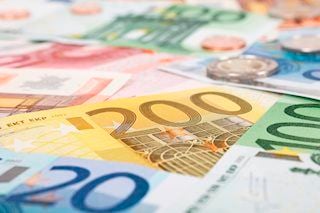EUR/USD remains below 1.0800 amid rising odds of a less dovish approach from the Fed
|
- EUR/USD may struggle, as recent US data has increased the odds of the Fed taking a less dovish stance in November.
- The heightened uncertainty surrounding the Middle East and the US presidential election supports the safe-haven US Dollar.
- ECB’s Klaas Knot emphasized the importance of "keeping all options open" to manage potential risks to growth and inflation.
The EUR/USD pair holds steady around 1.0790 during Monday's Asian trading hours, following losses in the previous session. However, the pair may encounter headwinds from a stronger US Dollar (USD), as recent upbeat economic data from the United States (US) has strengthened expectations for a less dovish approach from the Federal Reserve (Fed) in November.
On Friday, data showed the US Michigan Consumer Sentiment Index rose to 70.5 in October from 68.9 previously, exceeding the forecast of 69.0. Additionally, Durable Goods Orders dropped by 0.8% month-over-month in September, a smaller decline than the anticipated 1.0% decrease.
Additionally, heightened uncertainty surrounding the Middle East conflict may have strengthened the safe-haven appeal of the US Dollar (USD). Israel's targeted attack on Iran early Saturday, conducted in coordination with Washington and limited to missile and air defense sites, was more restrained than many had anticipated.
The USD is also bolstered by uncertainty surrounding the upcoming US presidential election. Former President Donald Trump’s Republican allies recently faced at least 10 court losses in battleground states that could influence the outcome of the November 5 election.
European Central Bank (ECB) Governing Council member Klaas Knot emphasized on Saturday the importance of "keeping all options open" to manage potential risks to growth and inflation. "Retaining full optionality would act as a hedge against the materialization of risks in either direction to the growth and inflation outlook,” Knot noted, adding, “We believe that our meeting-by-meeting and data-dependent approach has served us well,” according to Reuters.
Euro FAQs
The Euro is the currency for the 19 European Union countries that belong to the Eurozone. It is the second most heavily traded currency in the world behind the US Dollar. In 2022, it accounted for 31% of all foreign exchange transactions, with an average daily turnover of over $2.2 trillion a day. EUR/USD is the most heavily traded currency pair in the world, accounting for an estimated 30% off all transactions, followed by EUR/JPY (4%), EUR/GBP (3%) and EUR/AUD (2%).
The European Central Bank (ECB) in Frankfurt, Germany, is the reserve bank for the Eurozone. The ECB sets interest rates and manages monetary policy. The ECB’s primary mandate is to maintain price stability, which means either controlling inflation or stimulating growth. Its primary tool is the raising or lowering of interest rates. Relatively high interest rates – or the expectation of higher rates – will usually benefit the Euro and vice versa. The ECB Governing Council makes monetary policy decisions at meetings held eight times a year. Decisions are made by heads of the Eurozone national banks and six permanent members, including the President of the ECB, Christine Lagarde.
Eurozone inflation data, measured by the Harmonized Index of Consumer Prices (HICP), is an important econometric for the Euro. If inflation rises more than expected, especially if above the ECB’s 2% target, it obliges the ECB to raise interest rates to bring it back under control. Relatively high interest rates compared to its counterparts will usually benefit the Euro, as it makes the region more attractive as a place for global investors to park their money.
Data releases gauge the health of the economy and can impact on the Euro. Indicators such as GDP, Manufacturing and Services PMIs, employment, and consumer sentiment surveys can all influence the direction of the single currency. A strong economy is good for the Euro. Not only does it attract more foreign investment but it may encourage the ECB to put up interest rates, which will directly strengthen the Euro. Otherwise, if economic data is weak, the Euro is likely to fall. Economic data for the four largest economies in the euro area (Germany, France, Italy and Spain) are especially significant, as they account for 75% of the Eurozone’s economy.
Another significant data release for the Euro is the Trade Balance. This indicator measures the difference between what a country earns from its exports and what it spends on imports over a given period. If a country produces highly sought after exports then its currency will gain in value purely from the extra demand created from foreign buyers seeking to purchase these goods. Therefore, a positive net Trade Balance strengthens a currency and vice versa for a negative balance.
Information on these pages contains forward-looking statements that involve risks and uncertainties. Markets and instruments profiled on this page are for informational purposes only and should not in any way come across as a recommendation to buy or sell in these assets. You should do your own thorough research before making any investment decisions. FXStreet does not in any way guarantee that this information is free from mistakes, errors, or material misstatements. It also does not guarantee that this information is of a timely nature. Investing in Open Markets involves a great deal of risk, including the loss of all or a portion of your investment, as well as emotional distress. All risks, losses and costs associated with investing, including total loss of principal, are your responsibility. The views and opinions expressed in this article are those of the authors and do not necessarily reflect the official policy or position of FXStreet nor its advertisers.